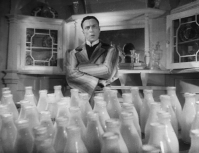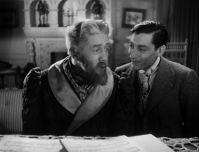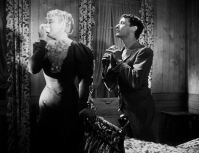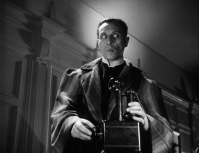Drôle de Drame
12/04/2011
France / 1937 / French
Directed by Marcel Carné
With Michel Simon, Louis Jouvet, Jean-Louis Barrault
 Inside and away from a bustling London street, the puritanically scary Archibald Soper, Bishop of Bedford, crusader for family values, stands at a podium delivering an impassioned speech denouncing the “immoral” crime novels so popular in England at the turn of the 20th Century. Current target of his ire is one Felix Chapel, a notorious trash writer whom no one has met, and who exists only by way of his pen. Soper calls such books as Chapel writes “wretched and vile” not due to the quality of writing, of course, but because they put bad ideas into the minds of the public. As is often the case with such symposia, the seats are mostly empty, with only a few filled by a scattering of lone crazies, nodding cronies, and stuffy temperance ladies. The Bishop’s cousin, the famed botanist Irwin Molyneux, sheepishly enters the room and hesitantly takes a seat.
Inside and away from a bustling London street, the puritanically scary Archibald Soper, Bishop of Bedford, crusader for family values, stands at a podium delivering an impassioned speech denouncing the “immoral” crime novels so popular in England at the turn of the 20th Century. Current target of his ire is one Felix Chapel, a notorious trash writer whom no one has met, and who exists only by way of his pen. Soper calls such books as Chapel writes “wretched and vile” not due to the quality of writing, of course, but because they put bad ideas into the minds of the public. As is often the case with such symposia, the seats are mostly empty, with only a few filled by a scattering of lone crazies, nodding cronies, and stuffy temperance ladies. The Bishop’s cousin, the famed botanist Irwin Molyneux, sheepishly enters the room and hesitantly takes a seat.
While trying to exhort audience members to give testimonials, Soper gets his thunder stolen by the outburst of a young man named William Kramps, a wanted killer who blames Chapel’s novels for his crimes. He loudly vows vengeance on the unknown author before being chased from the room by poorly-disguised undercover policemen. Kramps is an outspoken animal lover who kills butchers, exacting what he sees as a sort of poetic justice on them. The scabrous author in question, wanted by reformers and lunatics alike, is in fact the low-key Molyneux, a tiresome loaf by day who secretly works at home cranking out cheap quickie novels to earn extra money for his hard-up household. The poor fellow feels deeply rattled by his brush with Kramps, as the last thing he would want is to be made to suffer for his already shameful art. Even worse than the death threats, Soper then announces that he will be coming round to join Molyneux and his wife Margaret for dinner that very night, and is expecting the wonderful duck with orange that is the specialty of their cook.
The bored cook and butler seem to live for the daily visits of the milkman, Billy, who satiates their eagerness for bawdy stories, told with gothic detail, not unlike the sort of material found in Felix Chapel books. Molyneux’s live-in secretary, a young woman named Eva, awaits the milkman for a different reason, and joins the help in the scullery whenever he shows up, although she coolly deflects his aggressive proclamations of love. Margaret upbraids the four of them for being too wrapped up in stories to perform their jobs, and the cook and butler waste no time in quitting, off to look for a more stimulating work environment.
 Margaret, mortified at the prospect of having Soper over that evening, concocts a scheme wherein Molyneux will tell his cousin that she has left town to visit friends. Meanwhile she will stay in the background and prepare dinner, while Eva will pose as their servant. This way Soper will not find out that their help have left, and not be equipped to spread gossip that will cause her to lose social status. While he is over, the demanding and gluttonous cousin questions Molyneux as to the whereabouts of his wife. As the botanist bumbles through the lie, Soper, his mind contaminated with trashy crime stories, becomes convinced that the man is trying to hide the fact that he has done away with his wife to be with this younger woman. He then announces that he will be spending the night, to find out if Margaret will return.
Margaret, mortified at the prospect of having Soper over that evening, concocts a scheme wherein Molyneux will tell his cousin that she has left town to visit friends. Meanwhile she will stay in the background and prepare dinner, while Eva will pose as their servant. This way Soper will not find out that their help have left, and not be equipped to spread gossip that will cause her to lose social status. While he is over, the demanding and gluttonous cousin questions Molyneux as to the whereabouts of his wife. As the botanist bumbles through the lie, Soper, his mind contaminated with trashy crime stories, becomes convinced that the man is trying to hide the fact that he has done away with his wife to be with this younger woman. He then announces that he will be spending the night, to find out if Margaret will return.
Panicked, the Molyneuxs both flee the premises, holing up in a hotel in a seedy neighborhood until the fiery bishop has vacated their house. His imagination now going full throttle, Soper calls the police, who arrive, followed closely by scandal sheet journalists, to investigate the apparent murder of Madame Molyneux and the absconding of her husband. So here we have the set-up, which is to say, a situation that is more an array of chaotic threads that will become more and more interwoven through fate, coincidence, and contrived momentum. In the spinning top of intrigue that Soper has set into motion, each unwitting character has been supplanted by a counterpart of heightened drama. Poor old Molyneux finds himself demonized by newspapers, gossiping crowds, even the song of a beggar woman walking down his street.
As enamored of mad spectacle as Children of Paradise (1946) is, Drôle de Drame takes exaggeration in a more dedicated, more distorted direction. The bohemian dandy gets styled into a nonthreatening murderer and amateur Lothario; the drawing-room scientist habitually catches flies to feed to his carnivorous plants; and the crazed, judgmental soapboxer lives a dire spiral of hypocrisy. The romance, nostalgia, and pretentious morality that the film reaps from comedies of manners are all kept at a rolling boil, rather than being dropped headlong into the flames of dark cynicism.
The question persists: why is a film that so pointedly lambasts various echelons of French society after the Great War set in a different time and place? Why retain the setting of Edwardian England? For one thing, this altogether sidesteps the more depressing realities of France at the time that it was made, keeping the comedy pure and simple. It is possible that satire is at its most effective when it its creators draw it away from its immediate surroundings. But more importantly, in doing so here, they are broadening its scope to incorporate much more than is already inherent in its gags, much more than issues that could be deemed contemporary. Also, its preference for a palpable humor, arising from the atmosphere of a particular situation (be it flagrant vapidity or mounting discomfort) is decidedly British in hue, and unlike much of the low, physical French comedies of the day. Avoiding the sensitivity of a Sacha Guitry film, its untrimmed edges more anticipate the delights of elements of later Ealing pictures. No surface remains without barbs; high, middle, and low-brow each get disabused, often all of them within the space of one line, look, or gesture. The performances are just as guilty of this as the framing and the script. In refusing to inhabit one territory alone, the film drives molehills into every available one of them.
 Elation, hunger, young love and hero worship (the latter two somewhat clammily inverted) all contribute to the pudding, wrapping the content in exceedingly basic dialogue and decidedly complex humor. The only possibly important thing left out of firing range is art itself, something that screenwriter Jacques Prévert clearly understood the comedy audience too well to include (but not well enough to make Drôle de Drame a hit, as it turned out; the film’s ambitions evidently proved a bit too much to fully digest at the time of its release). The tropes of the ‘penny dreadful’ are shaken out and used up, almost cruelly, to their scant dregs. Even Molyneux doesn’t seem to know or care much about what he writes, and readily admits that he was given the ideas for his stories by Eva, who admits that she got them from the milkman – the upcycling of popular narrative.
Elation, hunger, young love and hero worship (the latter two somewhat clammily inverted) all contribute to the pudding, wrapping the content in exceedingly basic dialogue and decidedly complex humor. The only possibly important thing left out of firing range is art itself, something that screenwriter Jacques Prévert clearly understood the comedy audience too well to include (but not well enough to make Drôle de Drame a hit, as it turned out; the film’s ambitions evidently proved a bit too much to fully digest at the time of its release). The tropes of the ‘penny dreadful’ are shaken out and used up, almost cruelly, to their scant dregs. Even Molyneux doesn’t seem to know or care much about what he writes, and readily admits that he was given the ideas for his stories by Eva, who admits that she got them from the milkman – the upcycling of popular narrative.
The people in the film are fixated on stories to the point where they yearn, in all earnestness, to live them, and without once considering the absurdity or profound indecency of that. Hilariously, the character most stuck in this dreamworld is the Bishop, who creates his own detective narrative out of a mere social fiasco, and whose vocabulary seems entirely composed of unwieldy caricatures. This is not a privileged swing at what the masses consider drama and comedy (to them those things are as serious and meaningful as can be), but a lucid examination of how the supposed cornerstones of a society (religious men, policemen, men of science, etc.) routinely become déclassé themselves by way of their own haplessness, the very stuff of the trash novels that depict them. This fin de siècle London is no intellectual’s paradise. Literature is simultaneously despised and held up as a cultural barometer, its vagaries taken seriously by all camps, here to an almost dystopian degree. The film incorporates lower- and upper-class stereotypes of one another’s culture with equal profundity, mixing and matching them endlessly. While it could be thought of, all in all, as only mirroring an intellectual’s condescending images of escapist fiction and yellow journalism, its slapstick is wreathed in pain and its hackneyed motions are held aloft on an inexhaustible waft of self-assurance. The undercurrent (of course there had to be one) beneath that obviousness and contrivance is the cathartic eschewing of the philistinism that thrives on hysteria and being scandalized.
The story plays loud and loose with melodrama fodder, making itself contiguous with, but distinctly post-hoc to (and well beyond the limits of), the very broadly-categorized “poetic realism” of the 1930’s, into which Carné and Prévert’s first collaboration (this film was their second) Jenny (1936) is often placed. The three male leads define the varying shades of insanity that prevail: Barrault arrives via the hammed-up aloofness of the theatre, Simon the snarky emoting of silent comedies. Jouvet is the only one who seems invented for the film, his every eyebrow-raise and facial elongation dancing along with the parps of Maurice Jaubert’s tiptoeing score. It is a relief to realize that Simon was not, in fact, as frail as his character appears (so immersed is the performance), when he winds up doing drunken pratfalls, thereby proving the opposite. The actor’s usual comic dereliction is brought upmarket and made sad, his outsized mustache slurring and muffling his lines, while his poor, round and lumbering body is pushed hither and thither by circumstance.
 The performances all come from such drastically divergent corners that the result often nearly evokes James Sibley Watson’s short Tomato’s Another Day (1930), an early talkie attempt at making fun of talkies, their conventions and fallacies (including the notion that the medium of sound makes the jokes more immediate, and therefore stronger). But in this film the characters coalesce convincingly, in spite of their highly individualized and hermetic madness, so believably befuddled is the world they inhabit. From the killer who imagines he wouldn’t be crazy if he hadn’t read any Chapel novels to the milkman who delivers dozens of bottles to the house of the woman with whom he’s infatuated, exaggeration is the norm, and the humor is derived mainly from psychological tics. Lulls in insanity are filled in by the ample bit parts – a zealous Scotland Yard chief, a hysterical aunt of Irwin’s who always calls out to her long-departed dog, a drunken journalist who spends much of the film asleep on Irwin’s couch. As ridiculous as Kramps is, people nonetheless cower before him; Billy, the milkman, remains gratingly one-note, and thus works his charm. When Irwin is compelled to inhabit the role of the pulp novelist (making his creation into a real person) he’s just as bumbling as ever, but manages to go undercover. The leaden aspects of the characters, against the shifting milieus, creates illuminating contrasts.
The performances all come from such drastically divergent corners that the result often nearly evokes James Sibley Watson’s short Tomato’s Another Day (1930), an early talkie attempt at making fun of talkies, their conventions and fallacies (including the notion that the medium of sound makes the jokes more immediate, and therefore stronger). But in this film the characters coalesce convincingly, in spite of their highly individualized and hermetic madness, so believably befuddled is the world they inhabit. From the killer who imagines he wouldn’t be crazy if he hadn’t read any Chapel novels to the milkman who delivers dozens of bottles to the house of the woman with whom he’s infatuated, exaggeration is the norm, and the humor is derived mainly from psychological tics. Lulls in insanity are filled in by the ample bit parts – a zealous Scotland Yard chief, a hysterical aunt of Irwin’s who always calls out to her long-departed dog, a drunken journalist who spends much of the film asleep on Irwin’s couch. As ridiculous as Kramps is, people nonetheless cower before him; Billy, the milkman, remains gratingly one-note, and thus works his charm. When Irwin is compelled to inhabit the role of the pulp novelist (making his creation into a real person) he’s just as bumbling as ever, but manages to go undercover. The leaden aspects of the characters, against the shifting milieus, creates illuminating contrasts.
In the latter half, as the action becomes almost entirely sealed within chez Molyneux, an atmosphere of standard-issue comedy arises, all of the former elasticity seemingly stretched out of the film, and it begins to abandon obstacles such as motivation and consistency for streams of gags. Never does the film stop at merely satirizing, but gambles all of its credentials, both popular and intellectual, on an impossibly high and altogether imaginary tightrope. Mainstream culture demands satirists more than it does detractors, but it also needs those who can safely, from its parapets, bemoan the futility of battling against it. While Carné and Prévert do this almost perfectly in Drôle de Drame, it is their subsequent body of work that proves the fight worthwhile.